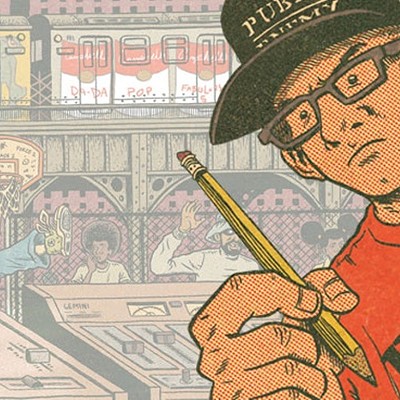This all might be a simple nod to diversity; certainly, as overdogs and underdogs emerge, the distinctions and disparities among the kids do serve a dramatic purpose. The eight were among 249 finalists who competed at the 1999 National Spelling Bee, in Washington, and if we're going to watch them for 97 minutes, it doesn't hurt to have a rooting interest.
But what's most poignant about Spellbound isn't who wins or loses. It's why they're competing in the first place. Not surprisingly, in many cases it has less to do with the glory, or the $10,000 prize, than with their parents.
Angela, the Texan, has parents who speak almost no English, and to whom her victory would apparently herald their collective arrival as real Americans (never mind the unexplored irony that most Americans value spelling about as much as they value penmanship). Ashley, from Washington, is driven to win, and one big reason is her mother, who literally dances at the thought of her baby's possible triumph. And if pious Ashley calls herself a "prayer warrior," Neil's Orange County family seems to be gearing up for an actual military conflict: The lanky overachiever's mom refers to the upcoming bee as "a war" while his dad plays drill sergeant, hiring tutors in every academic subject and pushing the boy into forced spelling marches with a full pack of parental expectations.
As often as not we get a better sense of the parents' personalities than the kids', which might be the point. Ted, the Missourian, is intensely laconic, but while his parents talk more, they seem pretty mellow about his prospects at the bee. New Haven equestrienne Emily inherits her ambition from her goal-oriented folks. April, a quiet girl from Ambler, Pa., seems a combination of mom's chirpy optimism and the low self-esteem of her dad, a tavernkeeper whose establishment has seen more hopeful days. In Tampa, Nupur, like Neil, bears up under her Indian parents' high standards. The only anomaly is diminutive, hyperactive Harry, a New Jerseyite whose relaxed-looking mom fails to provide a hint of why her logorrheic kid might out of the blue lapse into nasally tal-king-like-a-ro-bot.
Like most documentaries these days, Spellbound was shot on video, a medium that's good at giving the illusion of intimacy even as it provides us with only the surface of its subjects. But Blitz (in his first feature-length movie) and his skillful editor, Yana Gorskaya, are likewise good at sketching these kids, their families and their home environments in the few minutes allotted to each. So while we don't get to know them very deeply, we're fully engaged as they face words including "ecclesiastical," confront killer homonyms, and -- rather astoundingly, in a few cases -- work through the pressure, the tears, the hyperventilation. The National Spelling Bee is a big enough deal that its final rounds are televised on ESPN, and most of Blitz's kids are good enough to make it there.
I don't know whether it's peculiarly American to compete over something like the spelling of words, but Spellbound is a Rorschach test on social class and meritocracy. All these kids are bright; some might be brilliant. All of them work like mules at spelling -- a skill which, because it tolerates zero subjectivity, might seem to level the playing field nicely for rich and poor. But on the other hand, does it matter that some contestants have private tutors and spelling software -- and college-educated parents -- while others crib from dog-eared dictionaries and rely on the kindness of schoolteachers? And is the bee, in any case, a metaphor for the carnivore's marketplace of corporate capitalism, where no mistakes are allowed and only one can win? Blitz's choice of contestants to profile suggests that he thinks it's at least a possibility.
Another implicit question: Are spelling bees, as someone in the film half-seriously allows, "a different form of child abuse"? A few of these kids seem bred for competition, it's true. But all look highly relieved when they lose.














